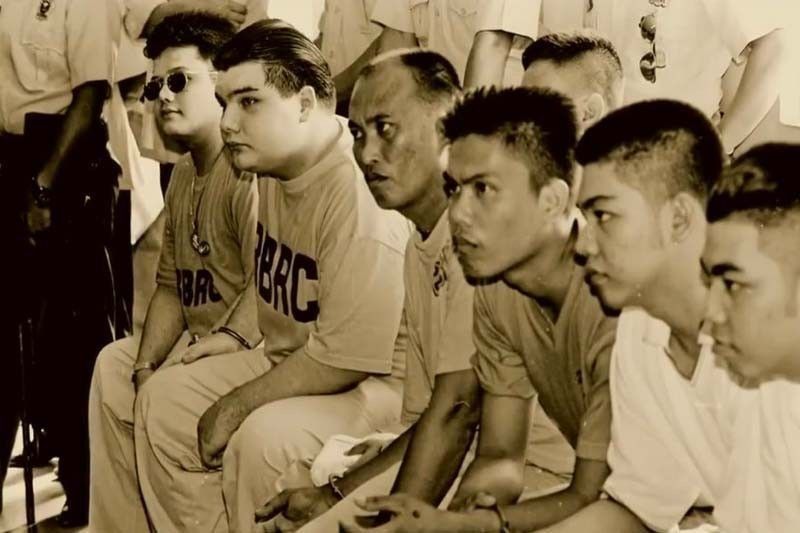2 Chiong convicts surrender to BuCor

MANILA, Philippines — Two of the freed rapist-killers of sisters Marijoy and Jacqueline Chiong have surrendered and another has manifested his intention to turn himself in, as more than 30 other convicts of various heinous crimes responded to President Duterte’s order to go back to prison and complete their sentence.
Department of Justice (DOJ) Secretary Menardo Guevarra told reporters yesterday that convicted rapist-killers Ariel Balansag and Alberto Caño surrendered to the Bureau of Corrections (BuCor) last Friday, while Josman Aznar is expected to surrender next week.
The furor over the near release of rapist-murderer Antonio Sanchez and the granting of liberty – beginning in 2013 – to 1,914 convicts under the Good Conduct Time Allowance (GCTA) law prompted the President to stop the release of the former Calauan, Laguna mayor and order the surrender or re-arrest of the freed convicts.
They have been given 15 days – from Sept. 4 – to surrender or be treated as fugitives.
Guevarra said BuCor is now processing the papers of Balansag and Caño.
Balansag, Caño and Aznar were reportedly freed on Aug. 16, based on three release papers from the BuCor, which directed officials of the New Bilibid Prison (NBP) to free them in compliance with the GCTA.
Aznar, according to his lawyer Edgar Gica, will surrender if served an arrest warrant.
“Under the law, only the court can order a person’s arrest,” Gica told The Freeman in Cebuano.
He admitted he has spoken only to Aznar’s family and not to Aznar himself.
“What came out in the reports is what the President said and not necessarily what the law mandates,” Gica said in reaction to President Duterte’s order for the surrender or rearrest of convicts released under the GCTA law.
The three convicted rapist-killers were reportedly found to have served 40 years of their sentence based on retroactive application of the GCTA law.
Balansag, Caño and Aznar were convicted in May 1999 for the abduction, rape and killing of the Chiong sisters on July 16, 1997 in Cebu City.
Also convicted were Francisco Juan “Paco” Larrañaga, a great-grandson of the late president Sergio Osmeña Sr., Rowen Adlawan, James Andrew Uy and his brother who was a minor at the time.
Larrañaga, a Spanish citizen, is serving his sentence in Spain under the Transfer of Sentence Agreement between the Philippines and Spain due to his dual citizenship.
Records from the Philippine National Police (PNP) showed 36 prisoners released under GCTA have surrendered as of noon yesterday.
The Police Regional Office 2 accepted the surrender of a total of 24 ex-prisoners, the biggest number of surrenderers so far. Their offenses range from robbery with rape to murder with robbery, attempted rape with homicide, robbery with homicide and parricide.
Meanwhile, an official of the Catholic Bishops’ Conference of the Philippines (CBCP) wants BuCor officials responsible for the erroneous application of the GCTA law to be held accountable.
Rodolfo Diamante, executive secretary of the CBCP-Permanent Committee on Public Affairs, said that firing former BuCor chief Nicanor Faeldon is insufficient and that he should be held accountable for his actions in the bureau.
“Resignation and firing the person(s) is a quick fix ‘solution’ to the problem. We should be able to make the persons who committed wrong accountable,” Diamante said.
Diamante’s statement came a few days after President Duterte fired Faeldon as BuCor chief following reports on the erroneous release of 1,914 heinous crime convicts under the GCTA law.
Despite firing Faeldon, Duterte heaped praises on the former BuCor chief, describing him as trustworthy at an event in Naga City in Cebu on Friday, prompting the Chiong sisters’ mother Thelma to walk out of the event in protest.
A few days after Faeldon was fired, the Office of the Ombudsman ordered a team of investigators to probe BuCor officials for possible irregularities in the release of heinous crime convicts.
Diamante stressed that while he recognizes the investigation being conducted by the ombudsman, an independent investigation should also be conducted so that authorities and parties concerned could get to the bottom of the issue.
“It’s a lot better if an independent investigation be conducted to discover how a good law like the GCTA was used to pursue one’s personal interest and agenda over and beyond the interest of the poor members of the prison community, who are supposed to benefit from this law,” he said. – Romina Cabrera, Marc Jayson Cayabyab, Raymund Catindig, Freeman
- Latest
- Trending






























